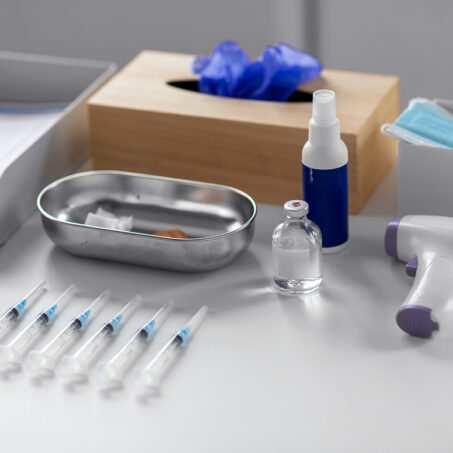CMS released memo QSO-23-10-NH on March 30 to strengthen already enhanced enforcements on nursing homes related to infection control deficiencies. Building off the enhanced enforcement implemented in June 2020, CMS policies now include increased civil money penalties (CMPs), a shortened time period for facilities to demonstrate compliance prior to the effectuation of a discretionary denial of payment for new admissions remedy, and stronger directed plans of correction. These enhanced enforcements will be applied to infection control deficiencies cited at the levels of harm, serious harm, and the likelihood to cause serious harm.
Additionally, enhanced enforcements will be applied when nursing homes are concurrently cited under Infection Prevention & Control (F880) and COVID-19 Immunization Requirements for Residents and Staff (F887) which requires nursing homes to educate residents and staff on COVID-19 vaccination and offer or assist in accessing COVID-19 vaccines to residents and staff. Strengthened enhanced enforcements outlined in QSO-23-10-NH are effective immediately and replace enhanced enforcements detailed in QSO-20-31-ALL.
Revised Enhanced Enforcement for Infection Control Deficiencies
For noncompliance at F880 and F887 concurrently, cited at scope and severity level 2 (D, E, F):
- Directed Plan of Correction that includes Root Cause Analyses and working with a Quality Improvement Organization or another qualified consultant; and
- Discretionary Denial of Payment for New Admissions with a 30-day notice period to achieve substantial compliance.
CMS notes that enhanced enforcement of F880 at scope and severity level 2 is applicable when F887 is also cited at any level. Additional remedies may apply if F887 is cited at scope and severity Level 3 or 4, as per normal enforcement policy outlined in Chapter 7 of the State Operations Manual.
For noncompliance at F880 cited at scope and severity level 3 (G, H, I):
- Directed Plan of Correction that includes Root Cause Analyses and working with a Quality Improvement Organization or hiring an Infection Control Consultant to develop and implement a corrective action plan; and
- Discretionary Denial of Payment for New Admissions with a 15-day notice period to achieve substantial compliance; and
- Civil Money Penalty imposed according to the CMP Analytic Tool with a ten percent increase adjustment.
For noncompliance at F880 cited at scope and severity level 4 (J, K, L):
- Directed Plan of Correction that includes Root Cause Analyses and working with a Quality Improvement Organization or hiring an Infection Control Consultant to develop and implement a corrective action plan; and
- Discretionary Denial of Payment for New Admissions with a 15-day notice period to achieve substantial compliance; and
- Civil Money Penalty imposed according to the CMP Analytic Tool with a twenty percent increase adjustment.
Enforcements for survey cycles with a start date prior to March 30, 2023 will be subject to enforcement remedies as previously outlined in QSO-20-31-ALL. Enforcement cases with a survey cycle start date of March 30, 2023 or later will be subject to the enhanced enforcements outlined in QSO-23-10-NH as outlined above.
What This Means for Members
With citations for noncompliance at F880 Infection Prevention & Control consistently among the top citations, nursing home providers are likely to notice impact from these policy changes. It will be important for nursing homes to recall that despite the coming termination of the COVID-19 public health emergency (PHE), nursing homes will continue to follow CDC recommendations for COVID-19 infection prevention and control in healthcare settings as a national accepted standard as required at §483.80 of the Requirements of Participation. Further, though requirements for educating and offering COVID-19 vaccination to residents and staff at §483.80(d)(3) were implemented by interim final rule during the PHE, these requirements will not end with the termination of the PHE and remain in effect until May 2024 or until otherwise specified by CMS.

 Shutdown Week Three: Impact of Ongoing Closure on Affordable Housing
Shutdown Week Three: Impact of Ongoing Closure on Affordable Housing Colleagues on the Move, February 4, 2026
Colleagues on the Move, February 4, 2026


